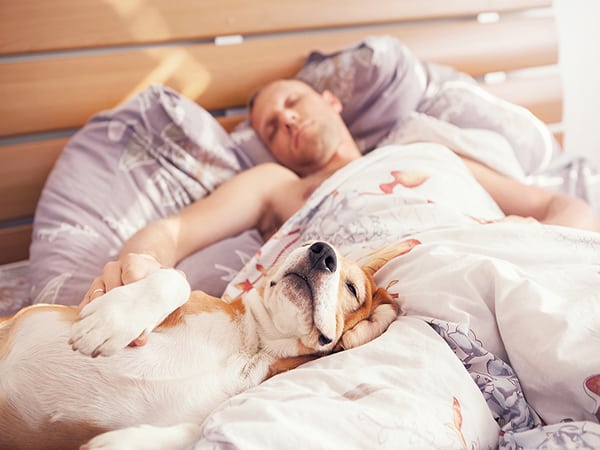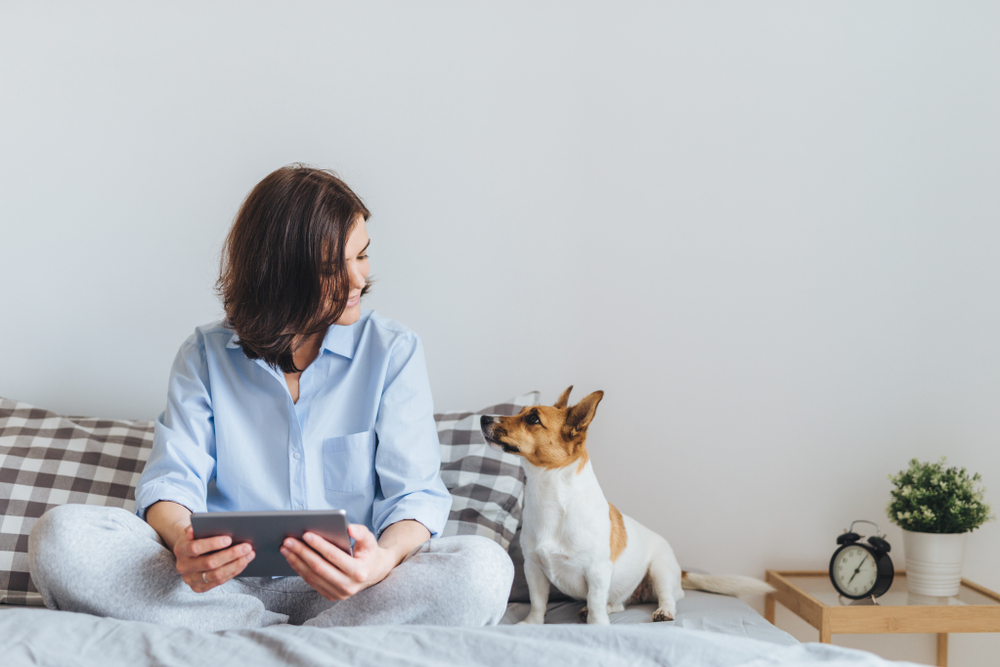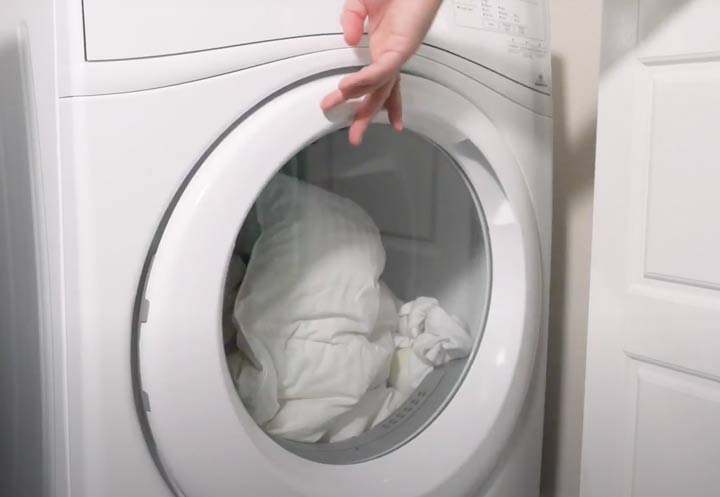For many pet owners, there’s nothing quite like sharing a bed with your dog. As you get ready for sleep or to wind down, chances are your pup hops in bed with you. It’ll come as no surprise, but studies show that humans form strong attachments to their pets and vice-versa.
Still, as comforting as it may be to get puppy snuggles at night, or to wake up to a happy dog eagerly wagging its tail ready to start the day, should you actually let your dog sleep in bed with you?
Here are the pros and cons of sharing a bed with your dog, and how to let your dog safely sleep with you if you choose to do so.

Benefits of Letting Your Dog Sleep with You
There’s a reason people believe dogs are man’s best friend. Decades of research shows that a dog’s relationship to humans is nearly the same as child-parent relationships—so if your fur baby feels like your actual baby, there’s science behind the phenomenon.
Therefore, it can be tough to say no to letting your dog snuggle up with you at night. Or, you may actually prefer sleeping with your pup and find it easier to fall asleep knowing they’re by you. These are the three main reasons why people let their dogs sleep in bed with them.
Comfort
Sharing a bed with your dog can provide a great sense of comfort. In fact, while it’s no secret that dogs can be noisy (and sometimes even snore), a recent study of 12 adult female humans and their dogs found that the humans rarely reported that their dog disrupted their sleep.
Many pet owners feel more comfortable with their dog at their side. They may feel safe with a “guard dog,” especially at night, or experience a “positive tactile and sensory distraction” as research has found about the comforting feelings that dogs can provide to their humans.
Companionship
At the end of the day, animals play a huge role in making us feel good. Research shows that interacting with animals (including dogs) can reduce loneliness and increase feelings of social support, offering a comforting and non-judgemental form of companionship.
So, if being away from your dog causes you to miss them terribly, especially at night, you may be more inclined to let them share a bed with you. Plus, it can be hard to say no to a determined pup pawing at your bedroom door so he or she can cuddle up in bed with you.
Emotional Health
If you feel happier and less stressed around your dog, it’s because dogs have the power to positively influence our emotional and mental health. Studies show that dogs reduce stress, anxiety and depression, all of which can contribute to poor sleep or sleep disorders.
This may be a key reason many pet owners actually find that they sleep better with their dogs at their side, so if you’ve ever felt that you truly can’t sleep without your pup, it may be more than just a strong bond between the two of you, but actual science.

Drawbacks of Letting Your Dog Sleep with You
While sharing a bed with your dog can offer comfort and even help you sleep better, there are a few potential drawbacks to bed-sharing with pets that are important to be aware of. Here are a few.
Sleep Disruptions
Depending on your dog’s breed and persona, he or she may actually cause sleep disruptions. Different pets affect sleep in different ways, with pet owners reporting better overall sleep with dogs than with their cat counterparts. Still, that’s not always the case.
Research has found that in general, people who co-sleep with pets take longer to fall asleep and are more likely to wake up tired. While the reasons aren’t entirely clear, being awoken by dog barking or other noises may be a possible source of sleep disruption.
Some dogs are also more antsy than others. They may get up several times during the night to cuddle up in a different nest of blankets, or to move from your pillow to your feet. While smaller dogs may not cause enough movement to wake you, a larger breed could wake you up.
Hygiene Concerns
As cute as our pups might be, they aren’t always the cleanest creatures. Dogs like to roll in mud and snow, or get into things that they shouldn’t, and their fur can carry all sorts of bacteria.
A surprising study conducted in 2022 may make pet owners rethink sharing a bed with their dogs. Out of a group of 28 healthy dogs and 22 healthy cats, of which 58% shared a bed with their owners and 30% actually under the blankets, a total of 86% of dogs tested positive for enterobacteriaceae on their fur or footpads (the bacteria group that contains salmonella).
Furthermore, fleas were found in 7% of the dogs’ favorite sleeping spots. If the findings aren’t enough to deter you from sleeping with your dog, keep reading for tips on how to keep your bed clean.
Aggressive Behavior
Aggression in dogs can take different forms, including growling, barking, snapping and/or biting. Sometimes, even the most gentle dogs may exhibit sleep startle, a form of sleep aggression that occurs when a dog is woken abruptly from their sleep.
While a human rolling over or even snoring probably won’t be enough to startle your dog awake to this extent, some noises that are outside of our control, like thunder or sirens, could provoke aggressive behavior while sharing a bed with your dog.
Tips for Sleeping With a Dog
If you just can’t say no to sleeping with your pup, there are a few steps you can take to ensure you get quality sleep and to also keep your sleep environment free of bacteria and germs.
Establish a Bedtime Routine
Like humans, dogs love routines. Once 9 p.m. rolls around, your dog may understand it’s time for bed if you go to bed at the same time every night (which on its own is a key building block to good sleep hygiene, a set of practices and behaviors that promote restful sleep).
If you establish a consistent bedtime routine, and more importantly, stick to it, your dog will begin to learn when it’s time to wind down, just like they learn when it’s time for a walk.
Perhaps you read a book in bed for an hour before turning out the lights, or practice evening meditation. Whatever your routine might look like, your dog will pick up the cues when he or she sees you starting your bedtime routine, and will understand it’s time to go to sleep.
Wash Bedding Often
It’s a good idea to wash your sheets every two weeks, although every week is ideal. This includes your duvet cover, especially if your dog is sleeping on top of it.
Pet owners may need to take more care with washing their bedding than non-pet owners. That’s because in addition to sweat and skin cells from your own skin, your bedding is also collecting pet dandruff, hair and perhaps even saliva.
To help reduce the risk of bacteria growth, be sure to wash your bedding often.

Use a Mattress Protector
A mattress protector can be a great way to protect your mattress, which is arguably the most costly item sitting on your bed frame. Not only can mattress protectors protect your bed from dust and allergens, they can also offer a waterproof solution to accidental messes.
If you have a puppy or a senior dog, or a dog with an illness that makes it hard to control when and where they use the bathroom, investing in a high-quality mattress protector can help keep your mattress dry in the event of an accident.
Where Should Your Dog Sleep?
As for where your dog should sleep, it’s ultimately up to you. Many pet owners love having their dogs sleep directly on the bed with them, while others choose to add dog beds to their bedroom or even keep a crate in the bedroom, especially in the case of young puppies.
At the end of the day, keeping your pet healthy is important, including while they sleep with you. If you choose to let your dog share a bed with you, be sure to follow a few precautions to keep both you and your pup safe, and be sure to wash your bedding often to keep your bed clean.

